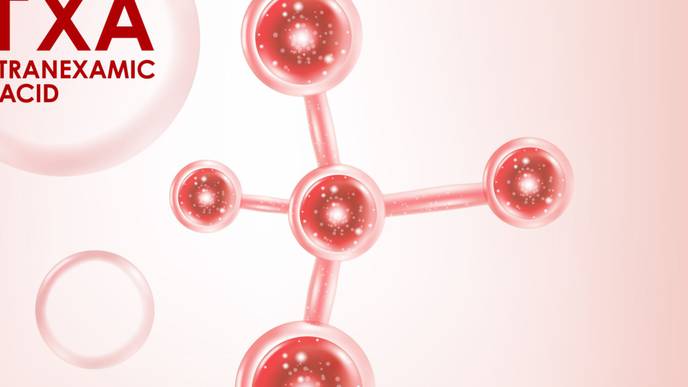Topical Tranexamic Acid Found Inferior to Intravenous Administration

04/09/2024
Administering tranexamic acid (TxA), a drug used to reduce bleeding during heart surgery topically rather than intravenously did not meet its primary endpoint of reducing seizures and was stopped early due to an increased risk of bleeding events, according to research presented at the American College of Cardiology's Annual Scientific Session.
TxA is used in many surgical procedures to prevent excessive bleeding, but it can cause seizures when used in heart surgery. The study assessed whether applying the drug directly to the heart instead of intravenously could help reduce seizures while maintaining the drug's benefits.
However, the results of a prespecified analysis conducted after the trial reached 75% of its intended number of participants showed that patients who received TxA topically suffered significantly more bleeding events as indicated by an increased need for blood transfusions.
"The signal for harm with topical administration for increased blood transfusions was clearly significant," said Andre Lamy, MD, a cardiac surgeon at the Hamilton Health Sciences, professor of surgery at McMaster University in Canada, and the study's first author. "Topical administration in its current form is inferior to intravenous TxA and should not be used."
The trial, called DEPOSITION, intended to enroll 3,800 patients but stopped after enrolling 3,224 patients undergoing heart surgery at 16 sites in six countries. The procedures involved coronary artery bypass surgery to create a path for blood to flow around a blocked artery and open-heart surgery to implant a new valve in place of a damaged or malfunctioning one. Some patients had one or the other procedure, and some had both.
Participants were randomly assigned to receive either intravenous TxA and a topical placebo or topical TxA and an intravenous placebo during their procedure. The doses used ranged from 5 grams to 10 grams and were determined by the anesthesiologist (for intravenous administration) and the surgeon (for topical administration).
A prespecified interim analysis found an elevated rate of bleeding among patients receiving topical TxA that was consistent across all sites and surgical teams. Overall, 35.1% of patients who received topical TxA and 26.8% of patients who received intravenous TxA required blood transfusions, representing a 31% increased risk of bleeding in the topical group. One possible explanation for the difference is that the drug may not be as readily absorbed with topical application, Lamy said.
In total, four patients who received topical TxA (0.2%) and 11 patients who received intravenous TxA (0.7%) experienced seizures. Although the trial did not meet its primary endpoint in terms of reducing seizures, Lamy said the study results could nevertheless help to shed light on the possible mechanisms through which the drug causes seizures when used in cardiac surgery.
The researchers observed seizures were more common with valve surgery than with bypass surgery. Since valve surgery exposes the interior of the heart to air while bypass surgery does not, Lamy said these findings could suggest that tiny bubbles of air carry the drug past the blood-brain barrier, allowing it to enter the brain.
This suggestion is corroborated by the results of an additional analysis, which was not part of the planned study methodology, in which researchers analyzed all seizures (instead of just those that were not considered to be related to strokes), finding that in the more inclusive analysis, topical TxA (0.2%) significantly reduced seizures in comparison to intravenous TxA (0.9%).
Looking ahead, the researchers said that new pharmacokinetic studies could help to optimize further the dosing, timing and administration strategy for TxA to achieve the greatest benefit while minimizing risks.
"What we've never done is to refine the dose needed to have the full action of TxA," Lamy said. "The trial is disappointing, but we've learned a lot. I think there is a message that is much broader than just cardiac surgery, in that we have to look at this drug with new eyes and new technologies to improve its performance."
Lamy said that such studies could be particularly beneficial in developing countries, where oral TxA is frequently used in obstetrics as intravenous administration of drugs may be more challenging.
Citation: Topical tranexamic acid found inferior to intravenous administration (2024, April 8) retrieved 8 April 2024 from https://medicalxpress.com/news/2024-04-topical-tranexamic-acid-inferior-intravenous.html
This document is subject to copyright. Apart from any fair dealing for the purpose of private study or research, no part may be reproduced without the written permission. The content is provided for information purposes only.

Facebook Comments